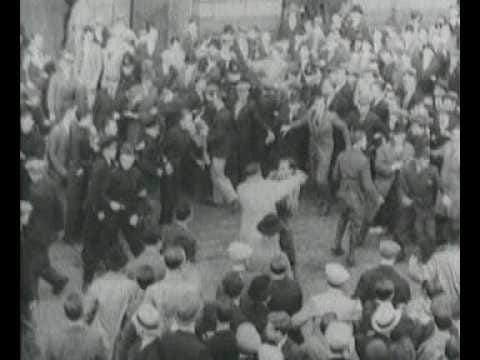Mosley with a stylist: The resistible rise of Laurence Fox
The media doesn't have to give him so much time... but it will.

I rode my bike down Cable Street yesterday morning. It was cold and the rain was lashing. I wasn’t doing something symbolic, I just live nearby and was going to the shop to buy the newspapers. But it was a big anniversary for Cable Street yesterday, 84 years since the Battle of Cable Street where Oswald Mosley’s fascists were stopped from marching through the East End by a coalition of Jewish groups, communists, socialists and others. It was a clash with both the fascists and the police sent to protect them. The fascists were defeated as they still must be.
In Stepney, barricades were built. The forces of the anti-fascists, numbering around 20,000, clashed with around 7,000 police — some of them mounted — who attempted to clear the roads to allows the 3,000 fascists to continue on their route. The fights involved sticks, rocks, and chair legs, as well as rubbish, rotten vegetables and literal shit poured on the fascists from above as chamber pots were emptied on their heads.
Mosley was made to abandon the march and the British Union of Fascists went to Hyde Park to continue their Hitler cosplay. 175 people were injured in the Battle of Cable Street, but the fascists did not march.
The danger of Mosley was acute. He was not a fringe figure. Born into the aristocracy, the Sir came from the baronetcy which he inherited from his father, he was elected as a Conservative MP in 1918. He was the youngest member of Parliament to take his seat — Sinn Féin’s Joseph Sweeney was younger — and was a confident speaker who did not rely on notes. After the atrocities in Ireland committed by the Black and Tans, Mosley fell out with his party and crossed the floor to join the Labour Party. He established himself, for a time, as a figure on the left.
The liberal Westminster Gazette, a forerunner of today’s media full of people ready to be wallet inspected at a moment’s notice, wrote of Mosley:
[He is] the most polished literary speaker in the Commons, words flow from him in graceful epigrammatic phrases that have a sting in them for the government and the Conservatives. To listen to him is an education in the English language, also in the art of delicate but deadly repartee. He has human sympathies, courage and brains."
Mosley tried to advance in the Labour Party, with some success — he was made Chancellor of the Duchy of Lancaster in Ramsay MacDonald’s 1929 government, with responsibility for fixing the problem of unemployment. But his proposals were blocked over and over again by the Cabinet.
He developed a scheme called the Mosley Memorandum, which called for high tariffs to protect British industries, nationalisation of many industries, and a programme of public works to provide employment. His plan was for a corporate state, and elements of it make it clear why he eventually found fascism so appealing. Again, the Cabinet rejected his ideas. He resigned and large parts of the media were sympathetic.
Another liberal paper, The Nation, said of Mosley’s decision: “We feel that Sir Oswald has acted rightly — as he has certainly acted courageously — in declining to share any longer in the responsibility for inertia." He fought again. Mosley hadn’t got his way and he was now done with the Labour Party. He founded the New Party, which acted as a spoiler, splitting the left-wing vote in by-elections and securing wins for the Conservative Party. Ah, sound familiar Change UK watchers?
The New Party got lots of media support. It was notoriously endorsed by the Daily Mail, which was under the control of Harold Harmsworth, later to be raised up as the first Viscount Rothermere. What was the appeal? Well, the New Party was rapidly becoming more fascist. Shortly before the 1931 election, Mosley was described by The Guardian — then the Manchester Guardian — in powerful terms:
When Sir Oswald Mosley sat down after his Free Trade Hall speech in Manchester and the audience, stirred as an audience rarely is, rose and swept a storm of applause towards the platform—who could doubt that here was one of those root-and-branch men who have been thrown up from time to time in the religious, political and business story of England. First that gripping audience is arrested, then stirred and finally, as we have said, swept off its feet by a tornado of peroration yelled at the defiant high pitch of a tremendous voice.
Shouting? Getting sweaty? Making crowds angry and agitated? Mosley had been watching some ‘friendly’ faces for that inspiration. He went on a European tour following the electoral failure of 1931 and, having witnessed Mussolini’s Italy, he returned determined the fascism was the future for Britain. He wanted to — and the echoing phrase may be familiar if you’ve been paying attention to US politics in the past five years — unite the right, and founded the British Union of Fascists in 1932.
Eight years later, in 1940, the American journalist John Gunther described Mosley as “striking handsome… the best orator in England. His personal magnetism is very great.” Mosley was a celebrity and his rallies drew huge crowds, but violence — often driven by his black-shirted bodyguards — combined with the news from Germany, saw the BUF’s mass support drain away. But Mosely continued on, loudly promoting antisemitism, and calling for a more blatant authoritarian-era.
At a meeting in Leicester in April 1935, Mosley made his first public statement of virulent antisemitism:
"For the first time, I openly and publicly challenge the Jewish interests of this country, commanding commerce, commanding the Press, commanding the cinema, dominating the City of London, killing industry with their sweat-shops. These great interests are not intimidating, and will not intimidate, the Fascist movement of the modern age."
Even after war was declared, Mosley continued to publicly push for ‘peace’ and appeasement towards his friends and heroes in Nazi Germany. It took the Fall of France and the beginning of Germany’s bombing campaign for him to — at least publicly — throw his support behind the war effort. Too little, too late.
The British Security Service along with the Metropolitan Police’s Special Branch infiltrated the BUF. By 1934, they were already worried about Mosley’s oratory. His behaviour was tolerated until May 1940 when the government finally considered him a direct threat to the safety and security of the nation.
Mosley was detained on May 23, less than a fortnight after Winston Churchill became Prime Minister, and after a 16-hour interrogation by Lord Birkett, who was later one of the British judges at the Nuremberg Trials, was interned under Defence Regulation 18B. Mosley, his second wife Diana, and their son Max, born shortly before the imprisonment, lived in a house in the grounds of Holloway Prison until 1943.
The BUF was banned.
And so I come to Aryan cutie, Laurence Fox, a failed musician and moderately successful actor — on the back of his father’s more illustrious career — who, backed with millions of pounds of dark money from such unsavoury (in my opinion, m’lud) people as Jeremy Hosking, a multi-millionaire private equity mogul who previously bankrolled the Conservatives and the Brexit Party.
The chuckle columnists in the liberal parts of the media — The Guardian, The Observer and The Independent — are, as they did with Nigel Farage, treating Fox as a funny bit of copy, a joke to be hooted about, because they never learn their lesson.
David Mitchell — the comedian not the novelist — wrote a column this weekend headlined “Hands up who takes Laurence Fox seriously”:
The party says it wants freedom of speech but, by implication, Gary Lineker’s exercising of that freedom on social media shouldn’t be allowed because he’s employed by a public institution that should be “free from political bias”. When does the freedom to express yourself end and inappropriate “political bias” begin? Does anyone who takes a job with a publicly funded body forfeit freedom of expression?
And how can we “celebrate our shared national history” in a way that’s “free from political bias or agendas”? Asserting that British history is to be celebrated is itself an agenda. It’s taking what happened and putting a positive spin on it. Anyone who claims that all the facts of British history are self-evidently wonderful and glorious is a dangerous and delusional nationalist.
Mitchell is right, Fox is a dangerous and delusional nationalist, but unlike the happy columnist, I take that very seriously. The right-wing media channels — not just papers but their talk radio counterparts and forthcoming TV channels — will give Fox acres and hours of coverage. He will be heard and he will be heard seriously by those outlets and the people who consume their output.
I take Fox seriously because he is a narcissist who wants desperately to keep getting the attention that acting has brought him and he will say anything to keep that spotlight on him. Fox, in the same way that mouthpieces like Darren Grimes have done, is allowing himself to be used as a megaphone by more publicity-shy bastards. In interviews, he has referred to his ‘policy people’… I wonder who they might be?
Columnists like David Mitchell are happy to hoot and holler about Fox because they don’t see how he could possibly knock them off their perches. I don’t see it like that. I know Fox is ludicrous and ludicrously stupid, but he has money, he has support, and he has a platform. That combination is a dangerous one.
At times it was possible to think Mosley was laughable, but he was always dangerous. Fascists must always be fought and Lawrence Fox is just at the beginning of his journey towards becoming a true fascist leader. Let’s not let it get that far.
¡No pasarán!
PS. Watch this… even after the war, Mosley kept trying.


